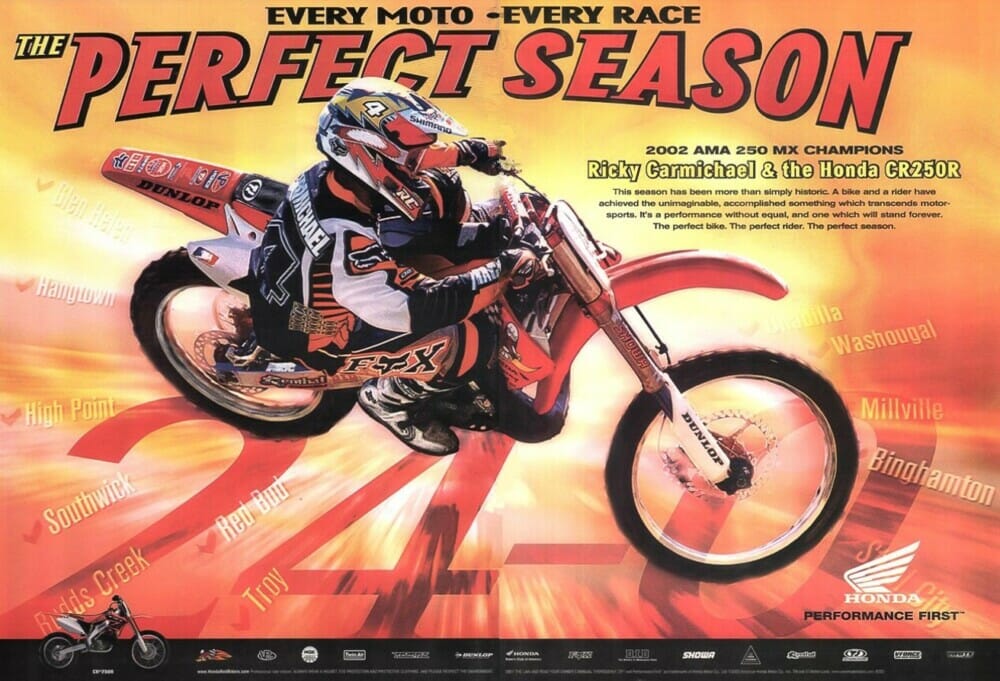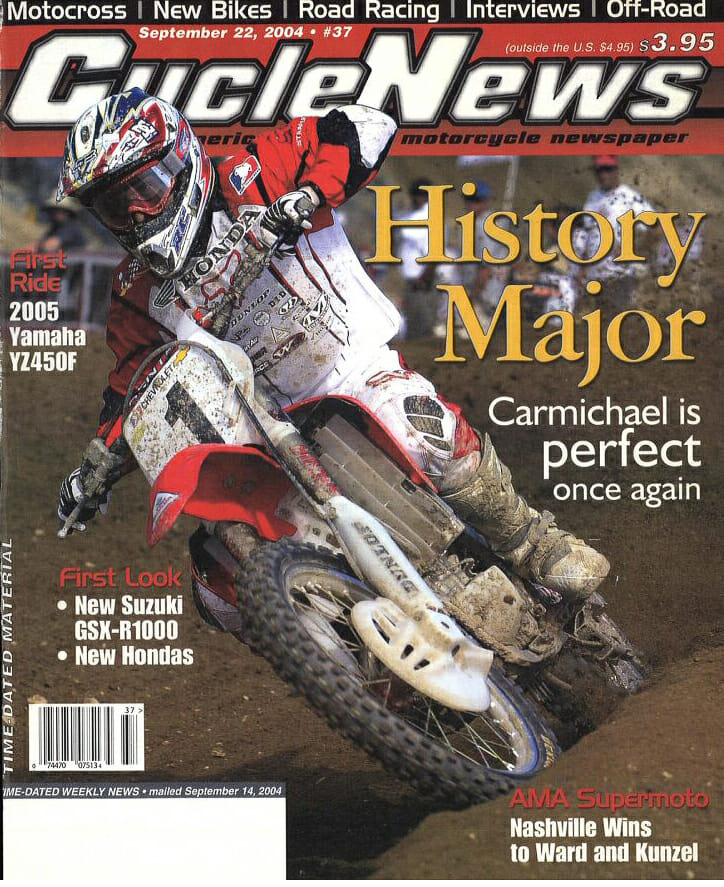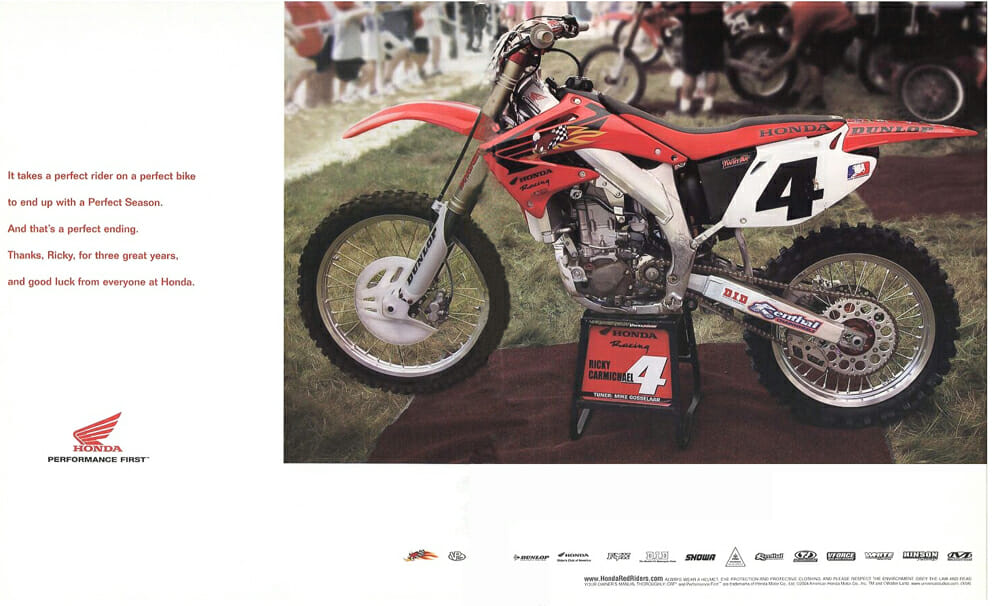Kit Palmer | September 1, 2022
Cycle News Archives
COLUMN
Ricky Carmichael’s Perfect Season
Ricky Carmichael celebrates a special anniversary on September 1, 2022. Twenty years ago, on September 1, 2002, Carmichael completed the first perfect season in motocross, winning all 12 rounds of the AMA/Chevy Trucks 250cc U.S. Motocross Championship. If that wasn’t impressive enough, the 23-year-old factory Honda rider won all 24 motos!
Soak that in for a moment.

You’ve probably, at one time or another, raced motocross, so you know what it means when people say that anything can happen in this sport. Of course, anything can happen in any sport. However, motocross is so brutal on both body and machine that you almost expect something “bad” to happen every time you roll up to the start line, like throwing a chain, twisting an ankle, breaking of a shift lever, or getting surprised by a seemingly harmless front-end washout. Simple things like these can easily mean the difference between a win and second place or a win and a DNF. So, completing a perfect season in motocross is extraordinary.
Of course, there were many people behind the scenes that contributed to Carmichael’s perfect season, obviously his family and friends, his Honda team, and, perhaps most importantly, his tuner at the time, Chad Watts, who had to have been on pins and needles more than anyone on the planet the day when Carmichael sealed the deal at the Steel City National in Delmont, Pennsylvania. Wonder how many times Watts tightened and re-tightened every nut and bolt and checked chain tension on RC’s CR250R two-stroke before the motos?
“If someone would have told me that I was going to accomplish this at the beginning of the season, I would have laughed,” Carmichael told Cycle News. “I never thought I would go undefeated. I just wanted to defend my title and win another one for Honda. It was a hell of a year.” Yes, that it was.

We named Carmichael our 2002 Cycle News Rider of the Year a few months later. He was the first person to receive the award two times, and he did it back-to-back. We asked many legends of the sport what they thought about RC’s accomplishment.
Johnny O’Mara, one of Carmichael’s best friends and mentor, said, “I probably never would’ve thought of that [going undefeated]. He’s all about winning, and I’ve never seen anyone take losing so bad—I can’t really explain it. Ricky also feeds off the right things and people. One time, after winning the Daytona Supercross when he was with Kawasaki, Bob Hannah came up to Ricky and congratulated him. Ricky said, ‘Hannah came into my truck and shook my hand!’ Bob doesn’t do things like that to anyone, and Ricky knows what Hannah meant to the sport.”
And what did Hannah have to say about Carmichael’s perfect season? “He’s totally dedicated,” Hannah said. “He is willing to give up the rest of his life to be an MX superstar; he’s willing to do that. There are guys that have talent but don’t have the heart—you have to be dedicated to beat him. It’s not the dinner the night before [a race]—you can’t eat three baked potatoes and win the next day. You have to train and work at it. If it’s raining on Tuesday, you can’t not train because you don’t want to get the sniffles—Carmichael will be out there.”
Aldon Baker, Carmichael’s trainer at the time, said, “I believe that no one else out there trains as hard as he does. My deal is that I look at what he is doing, look at his weakness and work on that. We do have to be careful because there’s a fine line between doing too much, and it’s not an easy program I’ve got for him. I also have to watch the mental part of it because the mind runs the body. He has a very tough mind, almost like a hawk that never says die, never gives up. Ricky always gives it 100 percent, some guys think they do, but he never gives up.”
“Carmichael rides every lap like it’s the last,” said Jeff Ward. “I mean, I’m pretty amazed he stays on the bike sometimes—he’s not out of shape, but his style’s pretty aggressive.”
David Bailey said, “He wants it more than everybody else, all the time. Before he goes to bed, when he’s trying to go to sleep, he thinks about it. When he wakes up, he’s thinking about it. When he’s riding and training, he’s thinking about it.”
“Ricky puts in more work and more effort than anybody else out there, of course,” said Broc Glover. “He’s a well-trained athlete. You know, he practices a lot and trains a lot, and he’s talented. It’s like watching a gymnast, or someone repeats something over and over and over, and it’s like, ‘God, it’s amazing how many times they can do that in a row.’ Well, Ricky’s the same way. He goes and practices consistently, over and over and over, and he’s a really talented rider.”
Rick Johnson said it was all about confidence. “I think he’s had many benchmarks that have built his confidence over the years,” Johnson said.
We even asked Carmichael himself. “I have to credit my bike,” he said. “I mean, my bike was excellent, really, really fast, and it handled well for me. But overall, a lot of pieces to the puzzle came together, and that’s what separates everyone else in the end. Also, my training. I feel I have one of the strongest training regimens out there.”

It turns out that Carmichael’s perfect season was no fluke. He did it again two years later, this time with Mike Gosselaar as his mechanic and on a CRF450R four-stroke. So, when he said after the Steel City race in 2002 that “I doubt this [a perfect season] would ever happen again,” he was wrong. In fact, he was doubly wrong.
In 2008, James Stewart, aboard a Jeremy Albrecht-tuned KX450F, went 24-0 while leading 369 of 382 laps to winning the title for Kawasaki. Maybe Carmichael had a gut feeling when he also said after Steel City in ’02, “I’m not sure that it’s really possible,” regarding future perfect seasons. “Unless Bubba [Stewart, who had just won his first 125cc outdoor title that year] stops winning, he’s going to break all kinds of records.”
Luck certainly plays a role when it comes to having the perfect season. Take the last race in ’04 at Glen Helen, for example, when Carmichael landed from a large jump onto a fallen motorcycle during practice. He touched down on Kevin Windham’s crashed bike so hard that it destroyed Carmichael’s frame, which had to be replaced before the first moto, which meant the entire motorcycle had to be torn apart and put back together again in a relatively short time. Also, luckily Carmichael wasn’t hurt in the incident, and the bike later performed flawlessly in the two National motos.
Believe it or not, Gosselaar said, through it all, that he wasn’t stressed that day. “Everybody is so professional here,” he said. “It was just an easy day for me.” But he admitted that he was thankful when the perfect season was over: “It’s a relief. I can sleep now at night.”
Carmichael’s perfect season in ’04 was also his last season with Honda before departing for Suzuki. It was also perhaps more impressive than his first perfect season when you figure some of the talent he had to contend with in ’04, riders like Chad Reed, David Vuillemin and Windham.
“It’s nice to do what I did this year when you have a guy that is his [Chad Reed’s] caliber,” Carmichael said at Glen Helen. “I’m so happy, I know I don’t show it, but it was a tough last couple of laps. I definitely had a lump in my throat. I must thank Honda, the guys at the shop, and the people who work with us every weekend. I’ve got great relationships with them, and I’m going to miss those guys.”
And they would miss Carmichael, too. After all, when everyone that year on the Honda team—technicians, mechanics, truck drivers, etc.—got a $325 bonus when one of its riders won a National, you’d miss him, too. CN